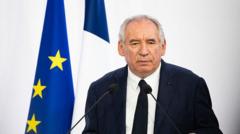Can the French PM Survive Amidst Unyielding Rival Opposition?

Published: 2025-08-26 08:45:28 | Category: world
The current political landscape in France is marked by uncertainty as Prime Minister François Bayrou faces an uphill battle to secure confidence for his controversial budget cuts. Following his announcement of a £38 billion (€44 billion) budget reduction plan, opposition parties have united against him, signalling a potentially destabilising moment for his minority government.
Last updated: 12 October 2023 (BST)
Key Takeaways
- François Bayrou called a vote of confidence on 8 September over budget cuts.
- Opposition parties, from the National Rally to the Socialists, plan to vote against him.
- Bayrou's proposed budget cuts amount to £38 billion (€44 billion).
- Current budget deficit stands at 5.8% of France's GDP.
- Macron's government could face new elections if Bayrou's confidence vote fails.
The Context Behind the Vote of Confidence
Prime Minister François Bayrou's call for a vote of confidence comes at a critical time for France, where economic pressures are mounting due to a soaring budget deficit. Following a history of political instability, the current government has found itself in a precarious position since December, when Bayrou took office after the previous administration collapsed.
In a statement reflecting the urgency of the situation, Bayrou emphasised that France is facing a "worrying and therefore decisive moment." He argued for the necessity of action, stating, "Yes, it's risky, but it's even riskier not to do anything." This sentiment underlines the gravity of the economic challenges that France is currently grappling with, as the country seeks to recover from the financial repercussions of the COVID-19 pandemic and other global economic pressures.
Understanding the Proposed Budget Cuts
Bayrou's proposed budget plan includes sweeping cuts across various sectors amounting to £38 billion (€44 billion). This proposal has not only stirred controversy but has also drawn widespread backlash from opposition parties. The cuts are aimed at reducing the budget deficit, which currently stands at 5.8% of France’s GDP, a figure that Bayrou and his government deem unsustainable.
Key elements of the budget cuts include significant reductions in public spending and the controversial proposal to eliminate two national holidays. These measures have raised concerns among citizens and unions, with protests planned across the nation under the movement dubbed "Bloquons tout," which translates to "Block Everything." This grassroots movement has garnered support from various unions and political groups, further complicating the government’s position.
The Opposition's Unified Stance
Opposition parties across the political spectrum have rallied against Bayrou's plans, signalling a united front that could jeopardise his government. From the far-right National Rally to the leftist parties, the response has been overwhelmingly negative. Jordan Bardella, president of the National Rally, publicly declared that Bayrou's actions signify "the end of his government." Marine Le Pen, the party's prominent leader, went further, stating that only by dissolving parliament could France regain control over its destiny.
As for the Socialists, the party's leader Olivier Faure condemned Bayrou's budget proposal, labelling it "unthinkable" for the Socialists to support. Faure emphasised the need for political stability, asserting that it is Bayrou's budget plan that has created this instability, not the opposition's resistance.
The Economic Implications of the Budget Cuts
With the impending vote of confidence, the stock market has reacted negatively, reflecting investor concerns about the government's ability to implement these drastic measures. The CAC-40 share index fell by 1.59% on Monday and dipped a further 2% the following day, indicating a lack of confidence in the government's fiscal strategy.
Finance Minister Eric Lombard has called for a collective effort to prepare a budget for economic recovery aimed at 2026. However, the government's commitment to cutting £38 billion from the budget raises questions about the long-term impacts of such austerity measures on public services and economic growth.
Possible Outcomes and Consequences
Should Bayrou fail to secure the confidence of the National Assembly, several scenarios could unfold. President Emmanuel Macron would then face the decision of whether to maintain Bayrou as a caretaker prime minister, appoint a new leader, or call for new elections. Each option carries its own set of implications for France's political landscape.
In the event of a government collapse, Macron's strategy to push for snap elections in 2024 could further complicate matters, potentially allowing for a shift in political power dynamics. The outcome of the confidence vote will not only determine Bayrou's fate but may also significantly shape the future of the French government and its approach to economic recovery.
Negotiating a Way Forward
While opposition leaders have firmly opposed the budget cuts, Bayrou's finance minister has hinted at the possibility of negotiations. This could involve revisiting certain aspects of the budget, such as the proposed cuts to national holidays. However, given the strong opposition stance, it remains uncertain whether any concessions will be sufficient to gain the necessary support to survive the confidence vote.
With the vote scheduled shortly before nationwide protests, the government must navigate a challenging landscape marked by widespread dissent and economic uncertainty.
Looking Ahead: What Happens Next?
As the political climate in France continues to evolve, all eyes will be on the National Assembly and the outcome of the confidence vote. Should Bayrou succeed, it may pave the way for the implementation of his budget cuts, but failure could trigger a significant political upheaval.
The implications of this vote extend beyond immediate political outcomes; they could also influence public sentiment towards the government and its ability to manage the country’s economic challenges. As protests loom and opposition parties remain steadfast in their refusal to support Bayrou, the coming weeks will be crucial for the future of France's governance.
FAQs
What is the purpose of the vote of confidence called by Bayrou?
The vote of confidence is aimed at securing support for his proposed budget cuts, which are intended to address France's mounting budget deficit and economic challenges.
How much is the proposed budget cut?
Bayrou's proposed budget cuts amount to £38 billion (€44 billion), which he argues is essential for the country's fiscal recovery.
What are the potential consequences if Bayrou fails the vote of confidence?
If Bayrou fails the vote, it could lead to his resignation, the appointment of a new prime minister, or even new elections, significantly impacting France's political landscape.
How are opposition parties responding to Bayrou's budget plans?
Opposition parties across the political spectrum have united against Bayrou's budget proposals, indicating they will vote against his confidence motion, which could jeopardise his government.
What is the current status of France's budget deficit?
France's budget deficit currently stands at 5.8% of the country's GDP, which Bayrou has deemed unsustainable without significant cuts to public spending.



